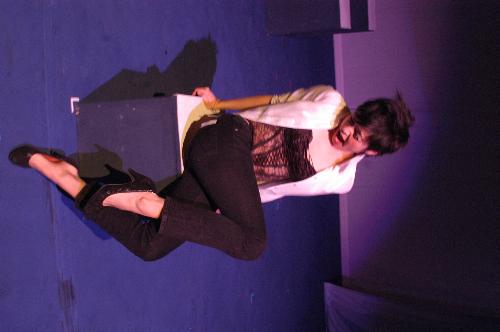
Julia C. W. Chan ’05 demonstrates her ability to moan in “The Woman Who Loved To Make Vaginas Happy,” the highlight of the second act.
“If Harvard had a vagina, what would it be? Johnston Gate?” Tracy E. Nowski ’07 asked the primarily female audience of the Agassiz Theatre at the opening night performance of the Athena Theater Company’s production of “The Vagina Monologues”. Spontaneous laughter erupted, easing initial trepidations at hearing the remarkably unattractive word “vagina” repeated with such uncommon frequency.
So began the sometimes funny, sometimes touching, sometimes flawed production of Eve Ensler’s modern classic about periods, childbirth, rape, orgasms and, of course, the vagina. Directors Nowski, Beth McLeod, Jen H. Rugani ’07, Amy Stebbins ’07, and Cat P. Walleck ’06 injected the familiar material of female suffering and pleasure with new, poignant Harvard-based stories of trans-gender youths. Produced by Rebecca L. Eshbaugh ’07, Kristen D. Lozada ’07, and Erinn M. M. Wattie ’06, the show ran from Feb. 23-25.
“Monologues” was first performed off-Broadway in 1996 and chronicles the thematically similar, but distinct, stories of the more than 200 women who Ensler interviewed. Since its inception, the play has become a cultural phenomenon, tied to raising awareness of violence against women. Proceeds from this production went to V-Day 2006 Spotlight Global Campaign on Comfort Women, the Network/La Red, the Louisiana Coalition Against Domestic Violent for victims of Hurricane Katrina, and El Amel Centers in Sudan.
With a mix of stories meant to elicit laughter and sympathy, the first-half of the production outshines the latter, clumsier second act. Humor takes center stage in a number of standout sketches: “My Angry Vagina” becomes a hilarious tale of the woes of being a female when in the able hands of Julia “JC” E. Cassis ’06 and Nicole M. Laws ’06.
In another piece aimed at raising awareness for Harvard’s trans-gender population, Julia Lunetta hams, “My mother never thought of the possibility that her son would become a lesbian.” This story, “Coming Out is Hard,” is winningly amusing in its honesty and humor. Similarly, Aidan S. Madigan-Curtis ’07’s interpretation of “The Gun I Carry is Unlicensed” examines the difficulties that transgender travelers have when deciding which box to check—male or female—for their passport. [SEE CORRECTION BELOW.]
The humorous “The Woman Who Loved To Make Vaginas Happy” was the highlight of the otherwise lackluster second act. A seductively-clad Julia C. W. Chan ’05 purred and strutted, making good use of the austere stage, demonstrating the joy of the sexual moan.
But as expected from a play with the word “vagina” in its title, there are also plenty of pieces that celebrate the vagina. Literally.
“If your vagina could talk, what would it say? What would it wear?” asked Adrienne M. White ’08, clad in the show’s white top-blue jeans uniform. Metaphors abounded: vaginas are seen as flowers, furniture, black holes. Sarah Mortazavi ’09’s spot-on portrayal of a seventy-year-old woman describing her perception of her vagina was the highlight of such moments meant to celebrate female empowerment.
Other such attempts at empowerment fell short, however: “My Vagina Was My Village” tackled the heavy subject matter of Bosnian rapes, yet the story was overwhelmed by background singing and failed to make the emotional impact that it theoretically should have carried.
Whereas this piece fails due to faulty sound and indecipherable pantomime, “Reclaiming Cunt”—what should be the climax of the night—falls short in its execution. The word “cunt” slowly pours out of White, but her passion fails to reach the audience; Kia D. Alexander ’08, Sachi A. Ezura ’08, and Lina Tetelbaum ’07 are left jumping and shouting “cunt” alone. Likewise, the finale, “I Was There in the Room,” a piece on childbirth, becomes more about clumsy staging than heartfelt sentiment.
But because the bottom-line of the play is a celebration of self-love, in the end both male and female audience members were on their feet. The terms “cunt,” “coochi snorcher,” “pussy,” and “vagina” are transformed into signifiers of more than just a body part. As “Monologues” makes clear, they can also cover the diverse range of women who all have a story to tell.
Regardless of how much the word “vagina” is associated with the negative connotations of sterile doctors in lab coats, this production of “Monologues” boils down to a well directed, powerful piece of acting; a show bursting with feeling and spirit that also happens to have an empowering take-home message.
CORRECTION
A review of "The Vagina Monologues" on the ArtsMonday page of the Feb. 27 edition misidentified the performer of "The Gun I Carry Is Unlicensed." The actress was Julia E. Morton '07, not Aidan S. Madigan-Curtis '07.
Read more in Arts
Portrait: Tom Conley












